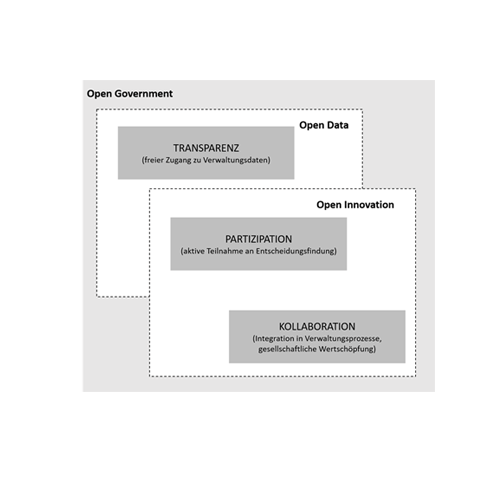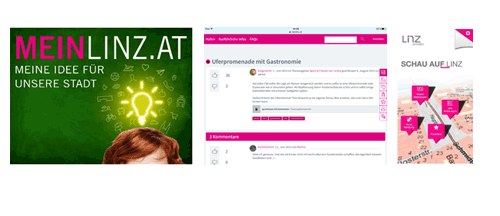For several years now, there has been a growing demand for open access to public data and closer cooperation between the state, civil society and business (open innovation). These efforts towards a systematic opening up of the administration and the state are subsumed under the term “open government. ” Open Government pursues the goal of opening up organizational and decision-making structures and achieving greater transparency, participation and improved cooperation between management organizations and their stakeholders. Modern technologies such as online platforms, mobile applications and social media offer new opportunities to communicate with citizens, to work together and to incorporate their expertise in administrative work.
Examples of Open Government in Linz are:
The Institute for Public and Non-Profit Management has been investigating the systematic release of administrative data and new forms of collaboration with external actors for many years. Currently, research projects are carried out in the following areas:


This project analyzed the implementation of open government practices in Austria. Together with the Center for Public Administration Research (KDZ), the PNP Institute conducted a survey among the heads of offices and mayors of Austrian municipalities.
Initial study results show the following:
Conference papers and publications within the framework of this project:
Schmidthuber, L.; and D. Hilgers (2018). Unleashing Innovation beyond Organizational Boundaries: Exploring Citizensourcing Projects. International Journal of Public Administration, 41(4): 268-283.
Schmidthuber, L.; Krabina, B.; and D. Hilgers (2017): Open Government – Ein Bericht über den Status Quo in Österreich. Forum Public Management (KDZ), Ausgabe 1, S.17-20.
Schmidthuber, L.; and D. Hilgers (2015): Open Government in Österreich: Neue Wege zu kooperativen Verwaltungsinnovationen. Das öffentliche Haushaltswesen in Österreich (ÖHW), Heft 3-4, 33-47.
Schmidthuber, L.; and D. Hilgers: Open Government: Investigating Innovation, Digitalization, and Knowledge Transfer. 18th European Academy of Management Conference (EURAM), Reykjavík (Iceland), 21 June 2018.
Within the framework of this project, we set ourselves the goal of better understanding the motivation of citizens to participate in open government. In cooperation with the Municipality of Linz, the users of two Linz Open Government platforms were asked about their reasons for participating.
Initial study results show the following:
Publications in this project:
Schmidthuber, L.; Hilgers, D.; Gegenhuber, T.; and S. Etzelstorfer (2017). The Emergence of Local Open Government: Determinants of Citizen Participation in Online Service Reporting. Government Information Quarterly, 34(3): pp. 457-469.
Hilgers, D.; and L. Schmidthuber (2018). Open Government: Exploring Patterns of Mobile Citizen-Government Interaction based on Individual-level Data. In: Albach, H.; Meffert, H.; Pinkwart, A.; Reichwald, R.; Swiatczak, L. (Eds.): European Cities in Dynamic Competition: Theory and Case Studies on Urban Governance, Strategy, Cooperation, and Competitiveness. Berlin: Springer. pp.: 57-72.
Schmidthuber, L.; Bogers, M.; and D. Hilgers (2017). Exploring Motivation through the Lens of Self-Determination Theory: Citizens' Online Participation. In: Gulcu Atinc (Ed.), Academy of Management Best Paper Proceedings. Online ISSN: 2151-6561. doi: 10.5465/AMBPP.2017.170
Schmidthuber, L.; Hilgers, D.; and S. Stütz (2017): Gestaltung des öffentlichen Raums durch plattformbasierte Zusammenarbeit: Untersuchung eines kommunalen Ideenwettbewerbes am Beispiel MeinLinz.at. V&M - Verwaltung & Management, 23.Jg (2017), Heft 3, pp.160-165.